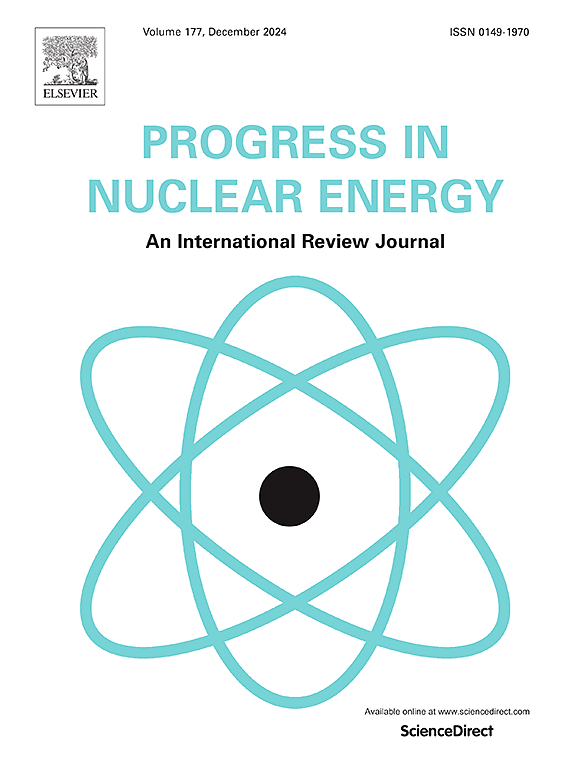Derivative dynamic time warping algorithm with introduced correction for varying load fault diagnosis of nuclear power system steam turbine units
IF 3.3
3区 工程技术
Q1 NUCLEAR SCIENCE & TECHNOLOGY
引用次数: 0
Abstract
The Derivative Dynamic Time Warping (DDTW) algorithm is improved to address the multi-parameters time series classification problem faced by nuclear power system steam turbine units varying load fault diagnosis. Firstly, the entire load changing process is treated as a single sample rather than multiple time-step-samples. This ensures the complete information on the load changing processes, while avoiding interference from normal data fluctuations during faults. Secondly, Time Series Position Coefficient and Time Series Length Coefficient are proposed to correct the DDTW algorithm from two perspectives: the sequences lengths and the data positions in the sequences. This solves the singularities and timeline scaling problems, thereby preventing interference introduced by data sequences' lengths differences and ''similar data appearing at different times'' problem. The nuclear power system steam turbine unit simulation model was built to obtain load changing processes data under normal and faults statuses. In the varying load fault diagnosis test based on these data, the improved DDTW algorithm achieved an accuracy of 1.38%–12.06% higher than other methods, reaching 87.50%. Finally, The Deep Convolutional Generative Adversarial Networks (DCGAN) model was used to generate data to supplement the limited samples of complete load changing processes, and the accuracy of the novel method increased to 95.51% with the increase of data used to support the comparison.
用于核电系统蒸汽轮机组不同负荷故障诊断的导入校正的衍生动态时间扭曲算法
针对核电系统汽轮机组变化负荷故障诊断所面临的多参数时间序列分类问题,对衍生动态时间扭曲(DDTW)算法进行了改进。首先,整个负荷变化过程被视为一个样本,而不是多个时间步长样本。这确保了负荷变化过程的完整信息,同时避免了故障期间正常数据波动的干扰。其次,提出了时间序列位置系数和时间序列长度系数,从序列长度和序列中的数据位置两个角度对 DDTW 算法进行修正。这解决了奇异性和时间轴缩放问题,从而防止了数据序列长度差异带来的干扰和 "相似数据出现在不同时间 "问题。建立了核电系统蒸汽轮机组仿真模型,以获取正常和故障状态下的负荷变化过程数据。在基于这些数据的负荷变化故障诊断测试中,改进后的 DDTW 算法的准确率比其他方法高出 1.38%-12.06%,达到 87.50%。最后,使用深度卷积生成对抗网络(DCGAN)模型生成数据,以补充完整负载变化过程的有限样本,随着用于支持比较的数据的增加,新方法的准确率提高到 95.51%。
本文章由计算机程序翻译,如有差异,请以英文原文为准。
求助全文
约1分钟内获得全文
求助全文
来源期刊

Progress in Nuclear Energy
工程技术-核科学技术
CiteScore
5.30
自引率
14.80%
发文量
331
审稿时长
3.5 months
期刊介绍:
Progress in Nuclear Energy is an international review journal covering all aspects of nuclear science and engineering. In keeping with the maturity of nuclear power, articles on safety, siting and environmental problems are encouraged, as are those associated with economics and fuel management. However, basic physics and engineering will remain an important aspect of the editorial policy. Articles published are either of a review nature or present new material in more depth. They are aimed at researchers and technically-oriented managers working in the nuclear energy field.
Please note the following:
1) PNE seeks high quality research papers which are medium to long in length. Short research papers should be submitted to the journal Annals in Nuclear Energy.
2) PNE reserves the right to reject papers which are based solely on routine application of computer codes used to produce reactor designs or explain existing reactor phenomena. Such papers, although worthy, are best left as laboratory reports whereas Progress in Nuclear Energy seeks papers of originality, which are archival in nature, in the fields of mathematical and experimental nuclear technology, including fission, fusion (blanket physics, radiation damage), safety, materials aspects, economics, etc.
3) Review papers, which may occasionally be invited, are particularly sought by the journal in these fields.
 求助内容:
求助内容: 应助结果提醒方式:
应助结果提醒方式:


